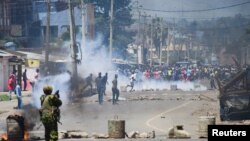In early April, Odinga ended anti-government protests after an appeal from President William Ruto, but said at the time they could resume within days if there was no meaningful engagement or response from the government.
Thousands participated in three marches held over two weeks in late March and early April. The protests, in part stirred by accusations of fraud in last August's presidential election, were all marred by violence.
"Kenyans are standing firm. We have agreed, the talks proceed, but I agree with the recommendation that has come out of here today that talks will proceed and protests will run parallel," Odinga told a town-hall style meeting in the capital Nairobi.
"We will continue. We are waiting for Ramadan to end. Once it ends, we will make an announcement for the protests," he said, referring to the holy Muslim fasting month.
Odinga's Azimio La Umoja alliance and Ruto's Kenya Kwanza alliance disagree about the content of the talks and who should steer them.
Azimio says lawmakers and others outside parliament should go beyond the selection of senior election body officials to discuss measures to address the cost of living and review the 2022 elections.
Kenya Kwanza wants to limit the scope of the talks to the selection of electoral officials, and the participants to lawmakers only.
Kimani Ichung'wah, majority leader in parliament and a member of Ruto's party, said Odinga's moves were meant to pile pressure on the government and get a stake in it.
Odinga has in the past said he had no interest in getting any role in the current government.
"Raila [Odinga] has never had an interest in any peaceful process and [this] is no surprise," Ichung'wah said in a text message to Reuters. "All their actions should therefore be viewed as actions done in bad faith and very insincere."
Kenyan police and interior ministry spokespeople did not immediately respond to Reuters requests for comments on the resumption of protests.









